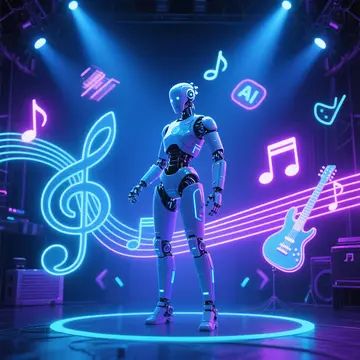?? Can AI Identify Music Genres?
As streaming platforms grow and music becomes more global, automated genre classification is more important than ever. But how well can AI identify music genres? Can it tell the difference between trap and dubstep, or lofi and chillhop?
The short answer: yes—and often faster and more accurately than humans.
Let’s explore how AI tackles this challenge, how it’s trained, and why the AI music genre landscape is changing the way we organize and experience sound.

?? How AI Classifies Music Genres
AI uses machine learning models to detect music genres by analyzing:
Tempo and rhythm patterns
Harmonic and melodic structure
Instrumentation
Spectral features (pitch, frequency, energy)
Lyrics (in some cases)
These features are extracted from audio files and fed into neural networks that are trained on thousands of labeled songs across genres.
?? AI Music Genre Detection Workflow
| Step | What Happens |
|---|---|
| ?? Audio Input | AI receives a raw music file |
| ?? Feature Extraction | Breaks the song into data: beats, pitch, energy, etc. |
| ??? Genre Prediction | Model compares features to known genre patterns |
| ? Classification Output | AI returns a genre (or multiple sub-genres) with confidence score |
This process happens in seconds—enabling mass classification for platforms like Spotify, YouTube, and SoundCloud.
?? Real Case Study: Deezer’s Spleeter & Genre Tagging
In 2019, Deezer, the French music streaming platform, released Spleeter, an AI tool designed to isolate vocals and instruments. But behind the scenes, Deezer has also been using AI to classify music genres.
?? Key Highlights:
Trained models using millions of labeled songs
Achieved over 80% accuracy on mainstream genre tagging
Used multi-genre tagging (e.g., “indie pop + electronic”) for nuanced classification
Enabled better playlist curation and music discovery
Deezer’s AI doesn’t just improve UX—it reshapes how artists get discovered through AI music genre tagging.
?? Why AI Genre Identification Matters
The music industry is flooded with over 100,000 tracks uploaded daily. Manual genre tagging is nearly impossible at scale.
Here’s how AI music genre identification helps:
| Benefit | Impact |
|---|---|
| ?? Music Discovery | Improves recommendations and search |
| ?? Catalog Management | Organizes libraries for labels and platforms |
| ?? Listener Personalization | Matches music to user moods and preferences |
| ?? Data Insights | Reveals emerging genres and listener trends |
For indie artists, correct genre tagging by AI can mean the difference between obscurity and being featured on a major playlist.
?? Challenges in AI Music Genre Detection
While impressive, AI still faces hurdles in perfecting genre identification:
Genre Overlap: Many modern tracks blend genres (e.g., hip-hop x jazz)
Cultural Bias: Models trained mostly on Western music may misclassify world music
Sub-genre Confusion: Differentiating “synthwave” from “electropop” is hard—even for humans
That said, advances in deep learning and audio embeddings are closing the gap.
?? Popular Tools Using AI for Genre Tagging
Here are platforms actively using AI to classify music genres:
| Tool / Platform | Role in AI Genre Identification |
|---|---|
| Spotify | Uses AI to tag and recommend songs |
| YouTube Music | Identifies genres for auto-playlists |
| AIVA | AI composer that tags its creations by genre |
| LANDR | Mastering platform with AI-based genre suggestions |
These platforms demonstrate how AI music genre tagging is becoming an industry standard.
? FAQ: AI Music Genre
Q1: Can AI accurately detect music genres?
Yes, modern AI systems can detect genres with high accuracy, especially on mainstream and well-defined categories.
Q2: How does AI handle songs with multiple genres?
Many AI models support multi-label classification, assigning multiple genres to a single track with confidence scores.
Q3: Is AI better than humans at classifying music?
In terms of speed and scale—yes. But in complex, niche, or evolving genres, human curators still have an edge.
Q4: Can I use AI tools to tag my own music by genre?
Absolutely. Tools like AIVA, LANDR, and Spotify for Artists use AI genre tagging to help creators better understand their sound.
?? Final Thoughts
So, can AI identify music genres? The answer is a confident yes. AI music genre detection is transforming how music is organized, recommended, and discovered. As algorithms evolve, so will their ability to handle the complexities of hybrid genres, regional styles, and emotional tone.
Whether you're a creator, label, or listener, embracing this technology opens the door to smarter music experiences.
